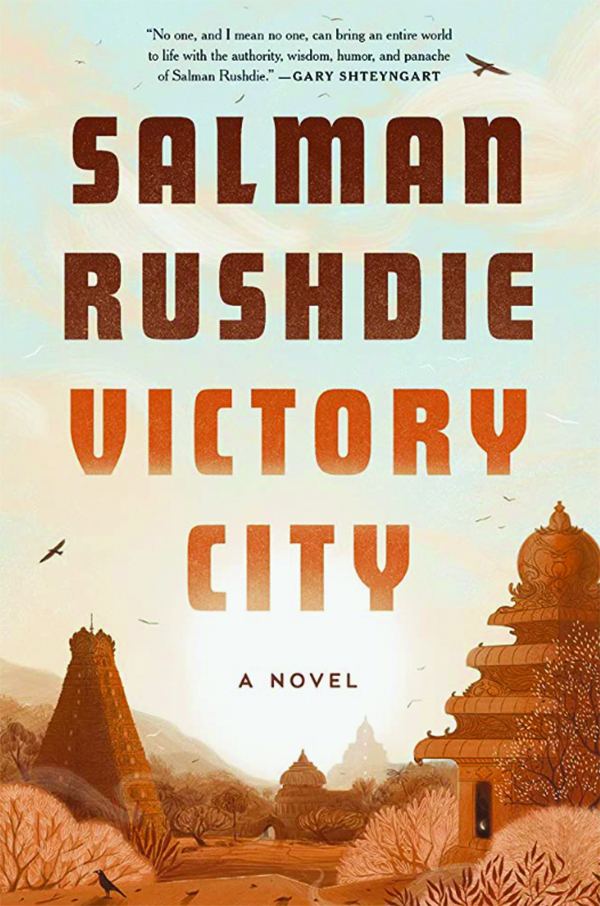
Salman Rushdie’s city is modern masquerading as ancient
Hugo Gurdon
Salman Rushdie appeared in the 1980s on a British TV book show with Anthony Burgess, author of A Clockwork Orange and Earthly Powers. Their host asked what book they were most embarrassed to admit not having read. Rushdie confessed to Middlemarch, George Eliot’s masterpiece, which is among the finest novels ever written in our language. Burgess, shocked, commented, “That’s big.”

Any hauteur one might have felt toward Rushdie for this failing was swept aside by admiration for Midnight’s Children, his brilliant work of magical realism, which had recently won the 1981 Booker Prize. It and he became overnight inspirations for a new genre and generation of writers. Midnight’s Children wove myth and mysticism, the earthy and the fantastic, history, politics, comedy, fury, wit, and sexual yearning into a huge tale centered on the creation of India and its undoing by the predations of Indira Gandhi. It was a marvel.
If the literary world is a pyramid of acclaim, Midnight’s Children lifted Rushdie to its peak. Yet even the accolades it won paled in comparison to the furor the author triggered in 1989 with The Satanic Verses. Ayatollah Khomeini, the first supreme clerical thug of Islamist Iran, reacted to its publication by issuing a fatwa, or edict, to Muslims to execute Rushdie for blasphemy. This response, which author V.S. Naipaul described with venom and a whiff of truth as “a most extreme form of literary criticism,” was a harbinger of things to come. Rushdie went into hiding 12 years before 19 of Khomeini’s coreligionists murdered 2,977 people in September 2001.
And so it is that the arrival of any new book by Salman Rushdie is never less than an event. This is a blessing and a curse. As one character in his latest novel, Victory City, says, “every gift, no matter how wondrous, also creates problems.”
Rushdie completed Victory City before Khomeini’s fatwa caught up with him in Chautauqua, New York, where last August, a young fanatic repeatedly stabbed and severely wounded him, lacerating his neck and blinding him in one eye. The attack came shortly before the author, who has gradually emerged into semipublic life again, was, with grim irony, due to talk publicly about America being a safe haven. The suspect is a 24-year-old New Jersey man with roots in a Lebanese stronghold of Iran’s proxy terrorist organization, Hezbollah.
Victory City and the grotesque attack that preceded it are two very different testaments to the power of words, which Rushdie and Khomeini recognized from opposite ends of a spectrum that runs from creativity to nihilism. The last line of the work expresses it plainly: “Words are the only victors.”
The novel is the story of a story and of the storyteller, a fiction presented as a breezy, demotic, modern novelization of an ancient epic poem, the Jayaparajaya, written in medieval India by a woman called Pampa Kampana.
After a traumatic childhood, Pampa is invested with the voice and powers of a goddess. At 18, she gives a bag of magical seeds to two cowherds who plant them and watch overnight as an entire city, Bisnaga, springs up from the ground with walls, palaces, shops, houses, and people — adults and children — fully formed.
Pampa then whispers with the goddess’s voice to the inhabitants, imparting to them all the memories, events, histories, and likes and dislikes they would have acquired over time had they not been conjured into existence instantaneously. The result: “Women were greeting each other like old friends, lovers were buying one another their favorite sweetmeats, blacksmiths were shoeing horses for riders they believed they had served for years, grandmothers were telling grandchildren their family stories, stories which went back generations at least, and men with old quarrels were coming to blows over long-remembered slights.”
This is what authors do — create worlds fully formed by their imagination as settings for their stories. Pampa conjures Bisnaga into existence, and the Jayaparajaya is the story of its rise and fall over the 247 years of her life. To make the parallel between authors and gods explicit, we learn that “the city thrived in the richness of its fictions,” which became facts “lost beneath the clamorous rhythm of the new day” and all subsequent days.
Pampa is central to Bisnaga’s fortunes. Royal dynasties, commoners, and foreign visitors come and go through wars and succeeding generations starting in the 14th century. But despite the antiquated setting in myth and imagined ancient history, despite gorgeous robes, jewels, spices, statuary, and war elephants with golden howdahs, despite talking crows and magical forests that turn men into women, despite all that is mysterious, Rushdie’s preoccupations are fashionable and political to a banal degree.
He and Pampa, in their narrative and her person, relentlessly press the case for women’s equality with, or superiority to, men. Pampa looks into the future and sees that “the dynasty would descend into squabbling, growing religious intolerance, and even fanaticism. Such was the line of her sons. Pampa Kampana’s daughters, however, had grown up to be forward-thinking, brilliant, scholars and warriors too; the most original children a mother could wish for.”
Pampa’s promiscuity and disdain for marriage are also apparently enlightened. She has “always believed that a woman can put down roots in herself and not define herself by standing next to any man.” This is prosaic, dreary stuff. After years living as a savage, the poetess wonders if “her attitude [might] be another visitor from the distant future, when marriage would feel archaic and unnecessary, and no one would give a damn about it.”
With warrior women, she fights an anti-colonial war against devious pink (English?) monkeys and dreams “of a Bisnaga in which all divisions — of caste, of skin color, of religion, of thought, of shape, of region — would be set aside, and premarajaya, the kingdom of love, would be born.” One need not be a cynic to find this unsophisticated.
Even the author seems bored. Rushdie adds detail apparently less to enrich his scenes than to pad his work with exotic nouns, such as by listing a queen’s taste for sweets — “Mysore pak and kozhukkattai, as well as Goan bebinca and Tamilian adhirasam, and even some more exotic delicacies from far away, sandesh from Bangla and gujjiya from the territory of the Delhi sultanate.” Relating a traveler’s fantastic stories, Rushdie ends three successive sentences with “et cetera.” His purpose is to brush the stories aside, but the impression is of him indifferently filling in creative space as though he can’t be bothered with his own inventions.
This is not “soaring and scintillating” or Rushdie “at his most virtuosic,” which is what the book’s dust jacket blurbs tell readers to expect.
When characters need a solution to overcome a challenge, Rushdie reaches for magic as though by reflex. Pampa wonders how to help a daughter and her lover get secretly away from their forest hideout to the port of Goa. Presto! She rises to the treetops in a sort of whirling leafy tornado in action sequences self-consciously described to invoke Crouching Tiger, Hidden Dragon, talks to a goddess, then returns to the ground able to transform all three of them into birds, and they simply fly to their destination. This allows the story to skip along at great pace with lots of action but not an ounce of drama. It’s like watching a superhero movie in which characters are unconstrained by human limits and so cannot compel our interest or engage our sympathies.
This underscores Rushdie’s other main theme, a rejection of religion and the assertion that “we ourselves are the gods we seek to worship, and capable of mighty deeds.” But it means Victory City is a saga articulated primarily by whimsy — which brings us back to Anthony Burgess. On the show 40 years ago, he commented that “whimsy is the death of art.” As I recall his words — I cannot find the video clip — I don’t think they were aimed at Rushdie, but they carried a warning he should have heeded.
Rushdie is brave, humane, witty, sometimes laugh-out-loud funny. But in his latest novel, at least, he is no longer a wonderful writer.
Hugo Gurdon is the editor in chief of the Washington Examiner.
